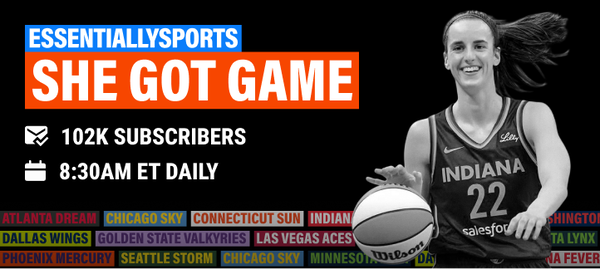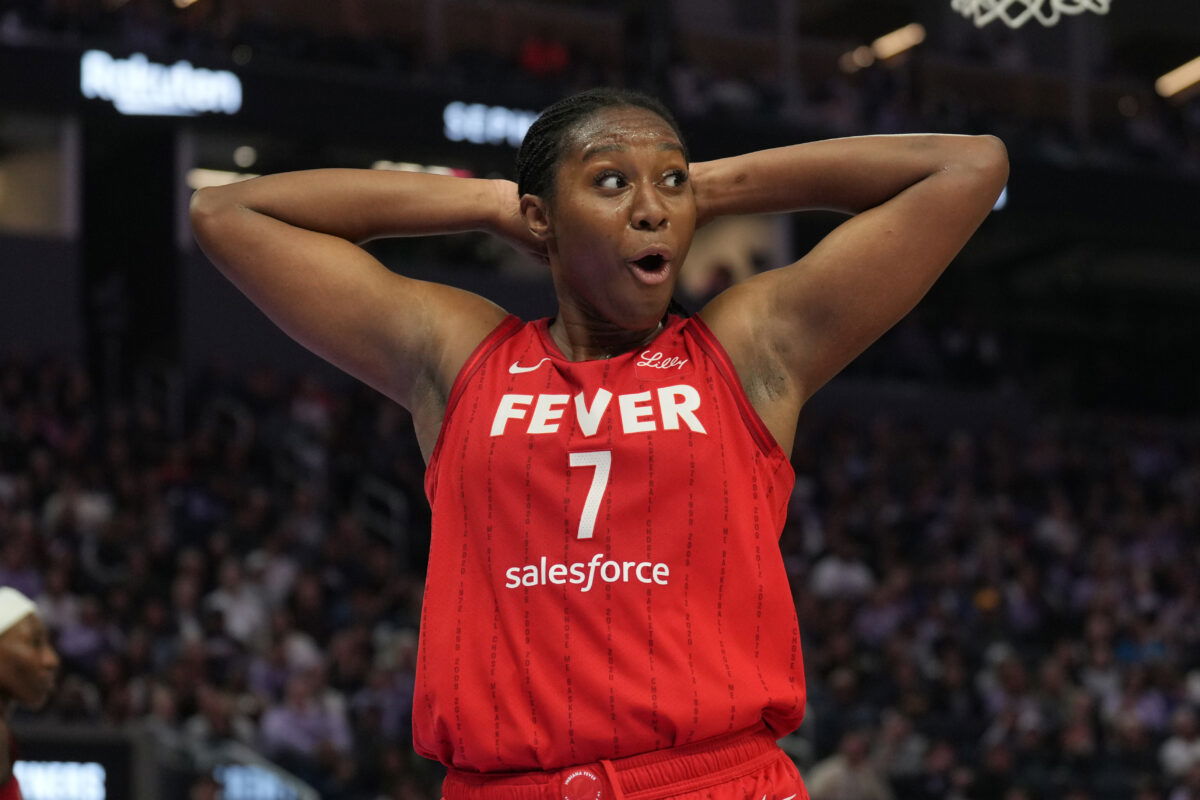
Imago
Jun 19, 2025; San Francisco, California, USA; Indiana Fever forward Aliyah Boston (7) reacts after being called for a foul during the second quarter against the Golden State Valkyries at Chase Center. Mandatory Credit: Darren Yamashita-Imagn Images

Imago
Jun 19, 2025; San Francisco, California, USA; Indiana Fever forward Aliyah Boston (7) reacts after being called for a foul during the second quarter against the Golden State Valkyries at Chase Center. Mandatory Credit: Darren Yamashita-Imagn Images
When the WNBA launched in 1996, all eight teams were like the NBA’s little sisters, stuck living in the same cities and sharing the same ownership. It wasn’t until 2002 that the league finally started handing out spare keys, allowing outside ownership groups to get in on the action. And yet, despite all that progress, it took until 2021 for a former player to crash the ownership party. That honor goes to Renee Montgomery, who retired at 34 after sitting out the 2020 season to focus on social justice initiatives.
Watch What’s Trending Now!
It was LeBron James who helped Montgomery buy the Atlanta Dream. Back then, amid all the drama swirling around Kelly Loeffler and the Atlanta Dream, LeBron James stepped in with a tweet that shook things up: he wanted to put together an ownership group to buy the team. Now, Renee Montgomery had already been dreaming about this for months, but LeBron’s tweet in January was like a green light. That’s when she went from “maybe someday” to “okay, game on.” “I just reached out to him and said, ‘Hey if you guys are serious, I am as well. If you could like point me in the right direction or if you could help me get to the next step,’ and the next step was Cathy,” Montgomery said.
And that’s how she managed to make her dreams come true and set standards for many women in the W. “My Dream has come true. Breaking barriers for minorities and women by being the first former WNBA player to have both a stake in ownership and a leadership role with the team is an opportunity that I take very seriously.“
ADVERTISEMENT
Since then, while ownership stake in WNBA teams still remains a bit untouched, players have also been making big moves elsewhere in the world of women’s sports. Whether it’s starting their own leagues or backing existing teams, they’re expanding their impact beyond the hardwood. And now, with Aliyah Boston stepping into the ownership space, that list just got a fresh and inspiring new addition.
Aliyah Boston: Boston Legacy FC
The Indiana Fever star and Aliyah Boston bought an undisclosed stake in the NWSL expansion franchise. Boston now owns part of Boston Legacy FC. Her exact stake remains private, but the NWSL is coming off a record 2024 season. They signed a 4-year media rights deal worth $240 million, which is a 40x increase. Their attendance saw a 44 percent increase, and their title game, which was their most-watched match ever, also saw an 18% increase as compared to 2023. So, Boston is investing in a league on the rise, just like the WNBA.
ADVERTISEMENT
Women’s empowerment is strong in this move as the primary ownership is an all-women group led by Jennifer Epstein, founder of Juno Equity, and backed by an investment group that includes three-time Olympic gold medalist Aly Raisman, actress Elizabeth Banks, Celtics GM Brad Stevens, and his wife, Tracy.
“I’m proud to join the ownership group of the Boston Legacy,” Boston said in a statement shared by the club. “This city helped raise me, and the support I felt here shaped so much of who I am. I couldn’t be more excited to have the opportunity to invest into a franchise that’s building something special for its players, for the city, and for women’s sports as a whole.”
ADVERTISEMENT
Boston, a three-time WNBA All-Star, has deep roots in Massachusetts. She led Worcester Academy to two state championships and earned the rare honor of having her jersey retired. Now, by investing in Boston Legacy FC, she is coming full circle, pouring her success back into the city that helped shape her. Now let’s move on to another expansion franchise, the Bay FC, who also have an owner from the WNBA.
Top Stories
Baker Mayfield Airs Dirty Laundry With Kevin Stefanski After Former HC Lost Faith in QB
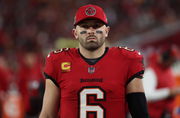
Carl Edwards’ Iconic Car Set to Return at Daytona 500 with Brad Keselowski’s RFK

Chiefs Receive Significant Travis Kelce Retirement Update Amid Eric Bieniemy’s Return
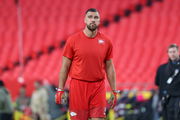
Hailie Deegan Teases Major Career-Turning Announcement After Securing Full-Time Racing Deal

Bills QB Bids Emotional Farewell to Sean McDermott as Josh Allen Reportedly Makes Replacement Choice Clear
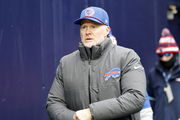
Tony Stewart’s Long-Awaited NASCAR Return Backfires as Daytona Entry Draws Harsh Reality Check
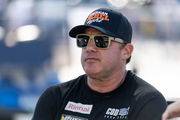
Sabrina Ionescu : (Investor In Bay FC)
The 2023 expansion franchise, Bay FC, brought in Sabrina Ionescu, a Bay Area native, as an investor in March this year. Ionescu will not only invest money, but she will also invest her time as she will be the team’s official Commercial Advisor. “I wholeheartedly understand how important investment really is and obviously you can talk about it and be about it, but you really have to want to be committed to it and invest to be able to see what you believe in come to light,” Ionescu told ESPN.
ADVERTISEMENT
The Bay Area is experiencing a boom in women’s sports, and the city is here for it. Bay FC joined the NWSL in April 2023 with a $53 million expansion fee, a record amount at the time. They finished 7th in their first season in the league, but it’s just the start for the franchise.
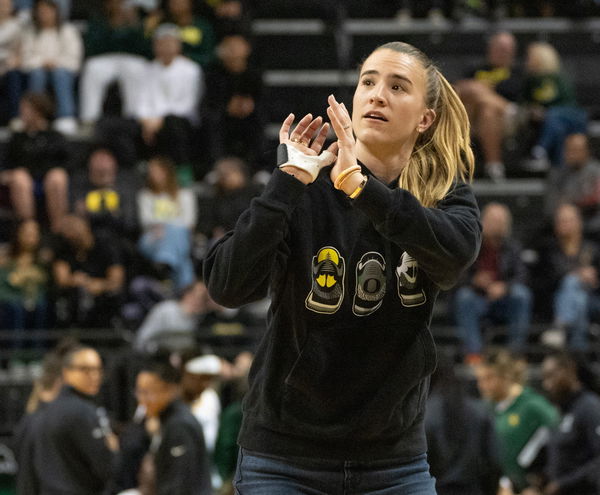
Imago
Sabrina Ionescu mimes taking a shot during her appearance on the court during the game between Oregon and Baylor at Matthew Knight Arena in Eugene.
Regarding her role as the Commercial Advisor, Sabrina said, “The Bay FC team and I look forward to driving branding partnerships for the Bay FC athletes and contributing to the overall success of the Club. As someone with deep ties to the Bay Area, this opportunity holds even more significance, and I am truly honored to be a part of such a special endeavor to continue to grow women’s sports.”
ADVERTISEMENT
Ionescu is the MVP on and off the court and is well qualified to take up this position at Bay FC. She featured on the cover of the NBA 2K24’s WNBA edition and has a lucrative brand deal with Nike, launching the Sabrina 1 (2023) and Sabrina 2 (2024). The three-point woman has other major partners like BodyArmor, AT&T, Michelob Ultra, and many more, which bring in millions per year. In her CV, her work with Kevin Durant as an ambassador for his media company, Boardroom, and as a strategic partner with his 35V investment firm makes her an ideal advisor for Bay FC.
Angel Reese (Investor In DC Power United)
Let’s move to the double-double queen who has been active off the court ever since her college days with LSU. Reese had 17 different brand deals, the most among any college basketball player at the time. Reese is a clever businesswoman, one who leaned into that “Bayou Barbie” persona and now flipped the MeBounds troll into a business opportunity. That persona is one reason she owns part of a football club at just 23.
ADVERTISEMENT
Angel Reese joined the ownership group of the professional women’s soccer team, the DC Power Football Club, which was one of the first 8 teams to compete in the 2024-25 season of the United Soccer League. Reese said she was “grateful and blessed” for the opportunity to join the Power FC ownership.“I want to help grow women’s sports and elevate female athletes across the board,” Reese explained. “We’re taking over, and I’m honored to be able to support Power FC and invest in women’s soccer in the DMV community.”
But the aspirations don’t stop there as Reese told The Athletic, “I’m just expecting to do as much as I can, help that organization as much as I can…I know a lot more women are going to start owning more things, and hopefully one day I can own my own team. That’s what I’m looking forward to. I want to own a WNBA team as well.”
ADVERTISEMENT
Angel Reese is the definition of unapologetic. Never one to bite her tongue, she’s been vocal about the glaring pay gap in the WNBA, pointing out that the league’s current minimum salary barely covers her basic living costs. Now, as one of the brightest young stars in the game, Reese is stepping into a bigger role: helping shape the future of the league through the ongoing CBA negotiations, which are expected to wrap up next year.
ADVERTISEMENT
Breanna Stewart and Napheesa Collier (Unrivaled Co-Founders)
Well, Breanna Stewart and Napheesa Collier are the pioneers in a true sense. The WNBA veterans just said, “Enough is enough,” while battling the WNBA and their lack of pay and opportunity. They decided to start a league of their own called Unrivaled, which just finished its first season this year. The league was founded in 2023 by the duo, with one of the primary motivations being to allow WNBA players to play domestically and to bypass complications from the WNBA’s prioritization rule for players who choose to play overseas in the WNBA offseason.
Unrivaled wasted no time making an impact in its debut season. With a $35 million capital raise, partnerships with more than 20 corporate sponsors, and a staggering 589.1 million social media impressions, the league reached 11.9 million viewers across its nationally televised games, setting a powerful foundation for the future of women’s professional basketball in the United States.
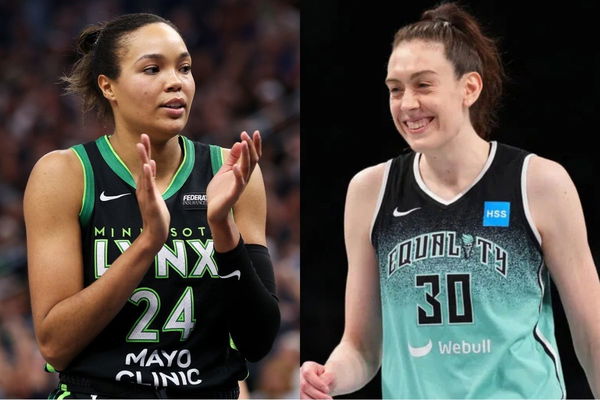
Reuters
Credits – Reuters
According to a league source cited by ESPN, Unrivaled generated approximately $30 million in revenue, double what officials had initially projected. This surge was fueled by a multiyear media rights deal with TNT, along with a strong slate of brand sponsors including Sephora, Ally, and Under Armour. Front office executives also pointed to impressive performance in ticket and merchandise sales as key revenue drivers.
On television, Unrivaled averaged 221,000 viewers per game on TNT and truTV, with its championship matchup between Rose and Vinyl peaking at 364,000 viewers. They represent a strong showing for a first-year league and underscore Unrivaled’s rapid rise in the women’s sports landscape. The Co-founders were recognized with a mention in the 2025 TIME100, the annual list of the 100 most influential people in the world.
Paige Bueckers (Unrivaled Investor)
Paige Bueckers inked a three-year deal with Unrivaled, and her first-year paycheck alone will top $350,000. That’s more than her entire four-year rookie deal with the Dallas Wings, which sits at a humble $348,198. This move comes after she already secured equity in the league through a college NIL deal. “The return on investment has been amazing,” Bueckers said about her investment. “Even the first year, the numbers were shocking. They blew it out of the water. It’s just a great time to be in women’s sports.”
It makes sense why Bueckers is all for Unrivaled. After all, she has been pushing for deserving pay in WNBA labor talks. “I mean, just the rightful pay? I think that’s what everybody’s like working for,” Bueckers told FOS. “But just like how much we invest in, how much we put into this WNBA season and how much it really has grown and blown up and expanded and the respect, attention, the accessibility — you see everything growing. So I feel like the pay should grow with those numbers that have been proven, that it’s only going to increase.”
Dawn Staley (Unrivaled Investor)
It’s not only players that are climbing to the Unrivaled train, as long-time legendary coach Dawn Staley is a part of the group of investors that have contributed to the new Unrivaled league. Staley had the chance to coach both players during the 2021 Tokyo Olympics, where she led the U.S. women’s basketball team to a gold medal victory.
“I believe in people,” Staley said when asked what made her believe in the league, “I mean, Napheesa [Collier] was somebody that I coached and somebody that I know, and someone who works hard. She’s a hard worker, she doesn’t take a play off. So you know you can back people who are] going to do whatever they need to do to make it be successful.”
Also, for Staley, her support is rooted in much more than money, as she had also said, “I would have supported it without monetarily supporting it just because I am a fan and enthusiast of women’s basketball.”
Sue Bird (Seattle Storm Investor)
Sue Bird’s legacy is, as President Alisha Valavanis put it, “woven into the fabric of Seattle.” It goes beyond the championships. Her influence on the franchise runs so deep that it earned her a statue, recently unveiled in her honor. “This actually feels reminiscent to my rookie year in a sense,” she said while looking forward to her first year on the team’s ownership group, Force 10 Hoops. Bird played a key role in the development of the $64 million Seattle Storm Center for Basketball Performance.
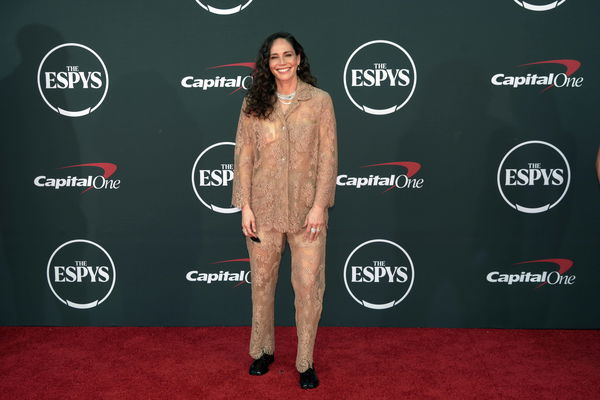
USA Today via Reuters
Jul 12, 2023; Los Angeles, CA, USA; Sue Bird arrives on the red carpet before the 2023 ESPYS at the Dolby Theatre. Mandatory Credit: Kirby Lee-USA TODAY Sports
But Bird was already shaping the future of women’s sports even before she retired. In 2022, while still an active player, she became an investor in NJ/NY Gotham FC, a National Women’s Soccer League (NWSL) franchise. “As the NWSL franchise in New York, investing in Gotham FC was an easy decision,” said Sue Bird, whose partner, Megan Rapinoe, an Olympic gold medalist like Bird, played for the OL Reign of NWSL.
Candace Parker (League One Volleyball Investor)
Candace Parker invested in the League One Volleyball (LOVB), the first professional full-season volleyball league in the United States, along with her daughter Lailaa, named as co-investor. Her daughter is a volleyball star at Campbell Hall High School and has a great career ahead of her. “Being able to watch what she is able to learn every day, I think it just reinforces how important sports are and the ability to have that opportunity for everyone,” Parker had said.
Parker and Lailaa also added that they are “focused on community and unlocking new opportunities for women in sports.” And they are moving in the right direction. LOVB operates 58 junior clubs, training over 16,000 athletes across 66 locations in 26 states. Around 600 of those athletes have gone on to compete at the collegiate level. The league wrapped up a successful inaugural pro season this year, with 28 matches broadcast on ESPN platforms. Backed by strong investor support, LOVB also raised $35 million in its Series B funding round.
These women are redefining what it means to be a professional athlete, dominating on the court while building power, influence, and ownership off of it. In a rapidly evolving women’s sports landscape, they are not just participating in change. They’re driving it. And we are all for it.
ADVERTISEMENT
ADVERTISEMENT
ADVERTISEMENT
